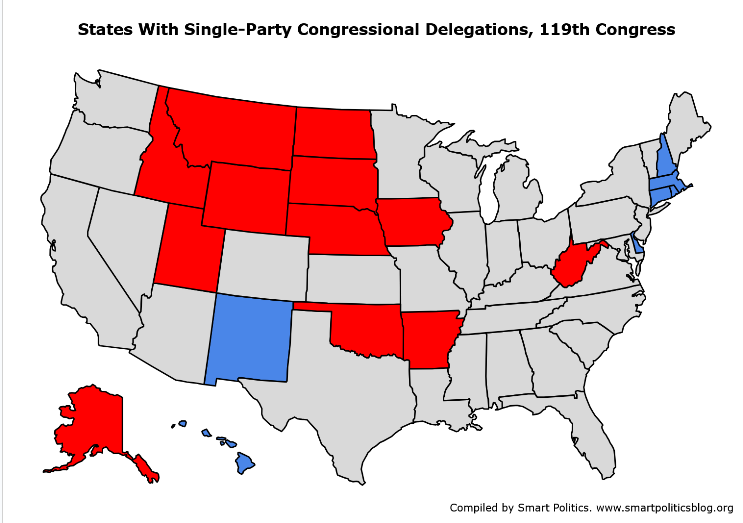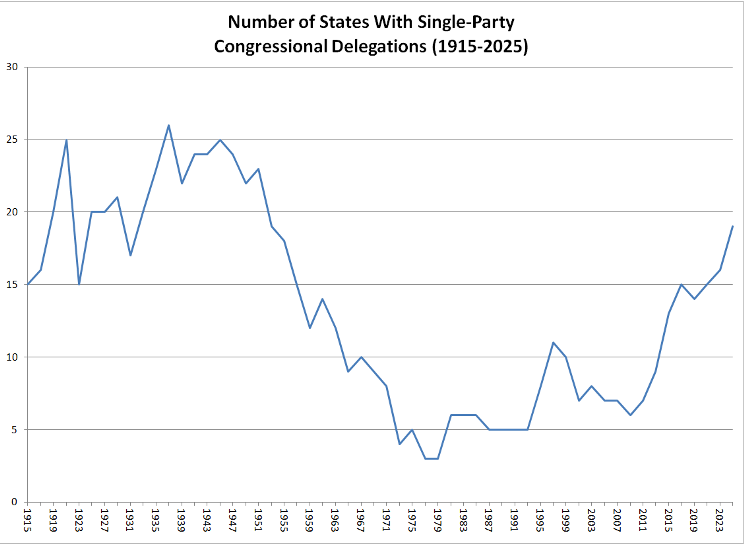Number of Single-Party State Congressional Delegations Reaches 70+ Year High
The 119th Congress will have the most states represented by just one party on Capitol Hill since the 83rd Congress and largest number of all-GOP delegations since the 71st
Recent Smart Politics reports have highlighted electoral trends signaling the demise of competitive, battleground states, such as the 119th Congress setting a record low number of split U.S. Senate delegations and the Democratic and Republican parties currently owning record presidential winning streaks in 38 states.
Additionally, when the 119th Congress convenes in five-plus weeks, it will do so with 19 state delegations comprised only of U.S. Representatives and U.S. Senators from the same political party – the largest number of states since the 83rd Congress convened 72 years ago in 1953.
This marks an increase of three states with homogeneous representation since the 118th Congress – all in the Republican column.
The GOP ousted Democrats for Alaska’s at-large U.S. House seat (Mary Peltola) and Montana’s U.S. Senate seat (Jon Tester) and flipped West Virginia’s open U.S. Senate seat (held by retiring Democrat-turned-independent Joe Manchin).
The 119th Congress will have 12 all-Republican state delegations (Alaska, Arkansas, Idaho, Iowa, Montana, Nebraska, North Dakota, Oklahoma, South Dakota, Utah, West Virginia, Wyoming) with seven states represented only by Democrats (Connecticut, Delaware, Hawaii, Massachusetts, New Hampshire, New Mexico, Rhode Island).
[Note: Vermont is not included in the Democratic column because Senator Bernie Sanders appears on his state’s ballot as an independent].

The GOP last owned all congressional seats in 12 states during the 71st Congress when the party ran the table in Connecticut, Delaware, Idaho, Maine, Michigan, New Hampshire, North Dakota, Oregon, South Dakota, Vermont, and Wisconsin after the 1928 election and picked off the lone Democratic U.S. House seat in Pennsylvania in a June 1929 special.
The number of single-party delegations is now more than triple the number following the 2008 election when there were just six such states: Hawaii, Massachusetts (until Scott Brown won a 2010 U.S. Senate special election), New Mexico, North Dakota, and Rhode Island for the Democrats and only Wyoming for the Republicans.
At least 13 states have been represented by one party in congress for each of the last six congresses.
The last time that occurred was during the 80th (24 states), 81st (22), 82nd (23), 83rd (19), 84th (18), and 85th (15) Congresses from 1947 to 1959.
From the 84th through the 118th Congress an average of just 8.9 states were represented by one party in Congress.
The recent rise in single-party representation in the states reflects a level that was quite common during the early- to mid-20th Century.
From the 64th (1915-1917) through the 85th (1957-1959) Congresses, no fewer than 15 states sent single-party delegations to D.C. with an average of 20.6 states doing so each cycle.
Democrats peaked at 23 states during the 75th Congress after the 1936 landslide while the GOP hit a high water mark during the 67th Congress after lassoing every seat in 17 states after the Election of 1920.
Overall, states have sent single-party delegations to Congress 753 times since the 64th Congress following the first cycle with U.S. Senators directly elected to the chamber in 1914. A total of 445 of these were all-Democratic and 308 were all-Republican.
Nearly every state has sent at least one single-party congressional delegation to D.C. during this 110-year span with California, Illinois, Missouri, New Jersey, New York, Ohio, and Tennessee the only exceptions.
Of the remaining 43 states:
- 15 states have alternately seen their delegations completely controlled by both major parties: Alaska, Arkansas, Connecticut, Delaware, Montana, Nevada, New Hampshire, New Mexico, North Dakota, Oklahoma, South Dakota, Utah, Washington, West Virginia, and Wyoming
- 16 states have had only uniform Democratic control: Alabama, Arizona, Colorado, Florida, Georgia, Hawaii, Kentucky, Louisiana, Maryland, Massachusetts, Mississippi, North Carolina, Rhode Island, South Carolina, Texas, and Virginia
- 12 states have had only uniform Republican control: Idaho, Indiana, Iowa, Kansas, Maine, Michigan, Minnesota, Nebraska, Oregon, Pennsylvania, Vermont, and Wisconsin
Democrats dominated the South for many decades during this span with southern states holding six of the top seven slots for the most cycles with all-Democratic delegations since the 64th Congress trailing only Rhode Island (29) at the top: Mississippi (28), Georgia (27), Louisiana (27), Arkansas (26), Alabama (25), and South Carolina (25).
Overall, Vermont has tallied the largest number of congresses with an all-Republican delegation since 1915 with 29 followed by New Hampshire (27), Idaho (27), North Dakota (26), and Wyoming (26).
Many states with moderate to large populations in the Midwest and Northeast saw the Republican Party hold every congressional seat at some point during the last century:
- Pennsylvania: All 38 U.S. House and Senate seats in the 69th (1925-1927) and part of the 71st (1929-1931) Congresses
- Michigan: All 15 seats in the 67th (1921-1923), 70th (1927-1929), 71st (1929-1931), and 72nd (1931-1933) Congresses
- Indiana: All 15 seats in the 66th (1919-1921) and 67th (1921-1923) Congresses
- Iowa: All 13 seats in the 65th (1917-1919), 66th (1919-1921), 67th (1921-1923), 68th (1923-1925), and 69th (1925-1927) Congresses and all 10 seats in the 79th (1945-1947), 80th (1947-1949), and 84th (1955-1957) Congresses
- Wisconsin: All 13 seats in the 65th (1917-1919), 66th (1919-1921), 67th (1921-1923), and 71st (1929-1931) Congresses and all 12 seats in the 80th Congress (1947-1949)
- Minnesota: All 12 seats in the 67th (1921-1923) Congress
- Kansas: All 10 seats in the 67th (1921-1923) Congress
Several states in the 119th Congress are just one seat shy of single-party representation on Capitol Hill with the GOP one seat away in five states (Kansas, Kentucky, Mississippi, South Carolina, Tennessee) and Democrats one seat away in four others (Maryland, Nevada, Oregon, Vermont).
Follow Smart Politics on X/Twitter.


Applying the ‘Bernie Rule’, CT did not have Democratic congressional monopoly during the 111th and 112 Congresses (after the defeat of Republican “Chris” Shays in the House in 2008, and before Democrat “Chris” Murphy succeeded Joseph Isadore Lieberman in the Senate in early 2013). Likewise, AK did not have Republican congressional monopoly during the 114th (2015 & 2016); it would have, had Joe Miller, the 2010 party nominee, been elected to the US Senate rather than Lisa Murkowski, who holds the distinction of never having received an outright majority of *first-choice votes* in any of her four general elections.
Somewhat analogous to NV and AZ – both voted to enshrine “abortion care” even while both voted for ‘that former president’ concurrently – the Last Frontier State voted (barely) to reject repeal of “ranked choice voting & open primary” while at the same time (narrowly) voted out Mary Peltola from her seat. Hopefully the election of a Republican to the House (in this case a progeny of a locally prominent Democratic family) as well as the re-election of a Republican governor two years prior will finally end the canard that RCV & Open Primary only benefits Democratic candidates.
The Farmer Labor Party of MN – which would merge with a certain ‘local third party’ in 1944 – never held a congressional monopoly, not even during the 1930s, I gather.
Fair point perhaps about RCV but the movement’s claim that it would benefit third parties and independent candidates I believe has disproved by the data. Also its claim it would put an end to plurality winners has absolutely been proven false: https://smartpolitics.lib.umn.edu/2021/11/01/how-often-does-ranked-choice-voting-produce-plurality-winners/
Farmer-Labor: Republicans have held at least 1 U.S. House seat since the 36th Congress (1859-1861). Democrats also held a U.S. House seat from 1933-1941 (in South Central Minnesota).
Murkowski’s 4x plurality first ballot ‘wins’ — if i recall correctly, she is also the only one to notch three of these as well?
The IN gop has now won 6 consecutive governor elections breaking the all time winning streak record.
Similarly, DE dems now have 9 consecutive wins tying the gop record of 9 in a row from 1900-1932, next cycle will likely gives dems 10 in a row and break the all time record. The UT gop and WA dems continued all time records in their states.
[…] need for new outreach may be greatest in the 12 states with no Democratic representatives in the 119th […]
[…] Coming out of the 2024 election, Smart Politics published articles documenting how 38 states are in the midst of record major party winning streaks in presidential elections, how the 119th Congress set the record for the fewest split U.S. Senate delegations, and how the number of single party state congressional delegations reached a 70-year high in January 2025. […]
[…] Congress setting a record for the lowest number of split U.S. Senate delegations, the number of single-party state congressional delegations reaching a 70+ year high, and the Democratic and Republican parties currently owning record presidential winning streaks in […]
[…] [This is the sixth in a series of Smart Politics reports examining electoral trends documenting the decline of competitive, battleground states. Previous reports focused on Democratic and Republican parties currently owning record presidential winning streaks in 38 states and U.S. Senate winning streaks in 27 states, the rise of single party U.S. House delegations, the 119th Congress setting a record for the lowest number of split U.S. Senate delegations, and the number of single-party state congressional delegations reaching a 70+ year high]. […]